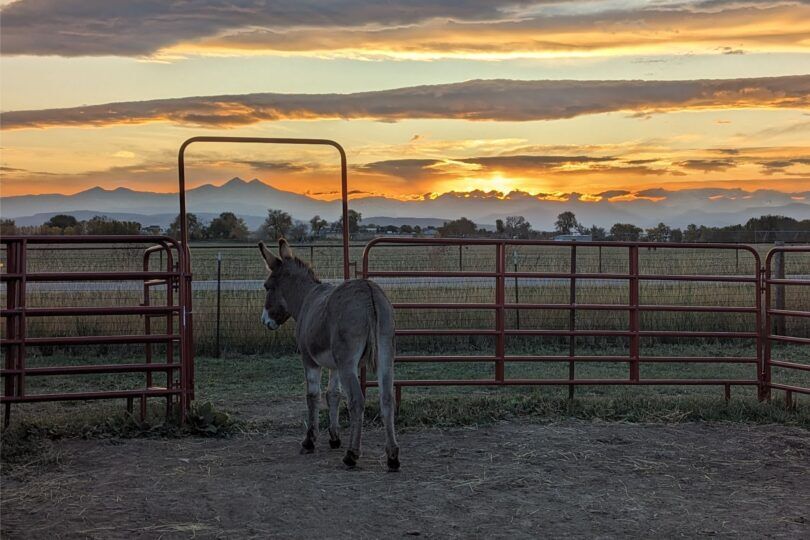Joint Supplements for Senior Donkeys
Just like with humans, horses, and dogs, as donkeys age, they can develop arthritis. A joint supplement can be a helpful way to keep senior burros moving comfortably.
A Horse Rookie Case Study
Einstein is a donkey in his 20’s. I rent him for pack burro racing from the ReDONKulous Ranch in Colorado. I’ve also had the privilege of keeping him on our property so I could train with him and to keep my BLM burro, Moon, company.
Source: Bottomless Backpacks
Einstein seemed a little stiff in his hind legs, so I started investigating an equine joint supplement that may help. When I showed Quarter Horses, I had a lot of success with Cosequin joint supplements.
Cosequin combined with CBD had worked miracles with our senior dog, as well.
SmartPak is my go-to for equine supplements, so I headed to their website and started looking at options.
*Disclaimer: Check with your vet before starting a new supplement to ensure it’s the right fit and dosage
A few joint health ingredients that I specifically look for on the label:
- Glucosomine
- Chondroitin Sulfate
- MSM (Methylsulfonylmethane)
- Boswellia Extract (a natural remedy)
It’s important to keep the unique nutritional needs of the donkey in mind when selecting a supplement.
By that I mean avoiding products with high protein or high sugar. Most supplements are available in powder form or pelleted form–this can be a personal preference (for you as well as the animal!).
Since I feed warm mashes in the winter to get some extra calories in a hard-keeping senior donkey, either format could be feasible to feed as a top dress.
It is important to separate animals at feeding time, especially if one is receiving supplementary nutrition. You want to be sure the right animal is getting the right nutrition!
I always separate Einstein and Moon for feeding time, as they have different nutritional needs. It’s also good handling practice for Moon, complete with a food reward!
Source: Bottomless Backpacks
Supplement Selection Process
Personally, I find pellets easier to feed and handle, as they are less likely to blow away in our occasionally blustery conditions. Pellets work as a top dress on low-starch grain as well as oats, if I’m not opting for a warm mash.
However, to pellet the ingredients listed above, you need a “carrier.”
Common carriers include alfalfa and distillers grains, both of which are red flags for donkey feeding.
Alfalfa contains high amounts of nitrogen (nitrates/nitrites) which can cause toxicity in large quantities or over a long period of time. While the amount in a supplement dosage is probably negligible, this isn’t something I want to risk.
Distillers grains can contain higher amounts of sugar than I’d like to see in a donkey diet.
Both of these ingredients are found in the SmartFlex Senior Pellets I evaluated, so I ruled out this option for Einstein.
Cosequin’s pellets use oat fiber as a carrier, which is perfect for feeding donkeys. I went ahead and ordered Cosequin ASU Pellets for Einstein.
The recommended daily dosage is 1/2 a scoop per day for an equine under 600 lbs. (Einstein is approximately 450 lbs)
Typically, you feed a “loading dosage” for the first 2-4 weeks, so he’ll receive 1 scoop per day for the first two weeks then 1/2 a scoop per day as a maintenance dose.
I was able to snag this supplement during a sale to save some money! Normal pricing for a maintenance dose (as of 2023) for a standard-size donkey will be $35.75/month or $1.28/day. Generally, AutoShip supplements include free shipping!
Source: Bottomless Backpacks
Results
After feeding the supplement for over a month, I noticed Einstein seemed to be a bit more comfortable.
Previously, picking up his back feet was a struggle.
He seemed stiff and unwilling to let me pick out his hooves. After 1-2 months on the supplement, his range of motion in his back legs seemed to be better and he was more willing to participate in hoof cleaning.
Could this be a byproduct of time spent training/practicing this maneuver? Possibly. But, the supplement certainly wasn’t going to hurt him, so I kept him on it for the duration of the winter.
Source: Bottomless Backpacks
Frequently Asked Questions:
Q: Can you feed a donkey horse supplements?
Yes and no. In some cases, horse supplements do translate quite well to donkeys, with a dosage adjustment to account for weight. In other cases, the ingredients and/or sugar content may make a supplement unsuitable for donkeys.
Q: Can you feed glucosamine to donkeys?
While “Glucosamine” has “glucose” (which means sugar) in the name, it isn’t necessarily bad for donkeys. Glucosamine is an amino sugar, which is processed differently from pure sugar.
Check out this article for more information.
Q: Do senior donkeys need joint supplements?
Arthritis is a common condition in older animals, donkeys included. Without treatment, arthritis can progress to causing chronic pain and even laminitis. Joint supplements and anti-inflammatory medications can help.
Long-term treatments such as Adequan (a medication injected into the joint itself) can also help alleviate inflammation and repair cartilage.
Joint supplements have also been proven to be helpful with arthritis and stiffness.
Want to read more about donkey care? Trot on over to these articles:
- Hammocks and Hee Haws – How to Camp with your Burro
- Safety First: How Much can a Donkey Carry?
- Donkeys and Horses: Better Together or Bad Roommates?
- Do Donkeys Bite? And How to Keep Your Fingers
- Barn Management Best Practices for Burros
